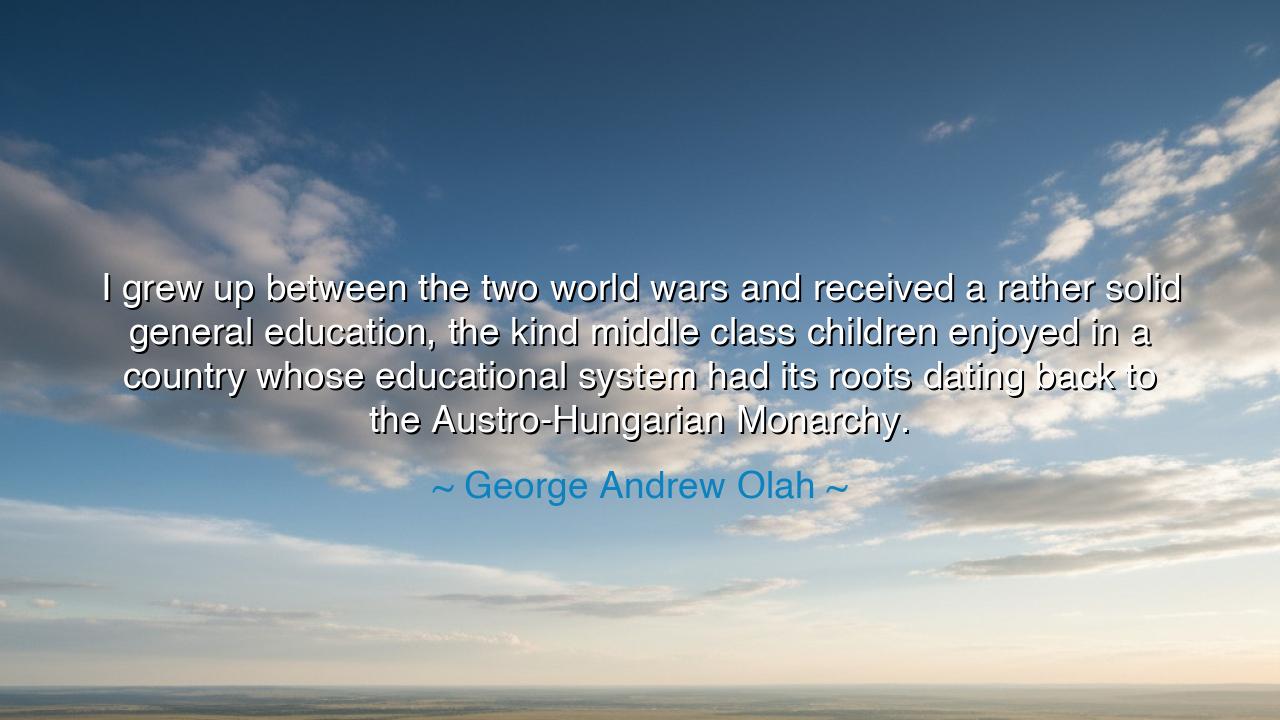
I grew up between the two world wars and received a rather solid
I grew up between the two world wars and received a rather solid general education, the kind middle class children enjoyed in a country whose educational system had its roots dating back to the Austro-Hungarian Monarchy.






In the words of George Andrew Olah, the great chemist and thinker, we glimpse not only a recollection of personal history, but the echo of an age that forged minds of iron and souls of endurance: “I grew up between the two world wars and received a rather solid general education, the kind middle class children enjoyed in a country whose educational system had its roots dating back to the Austro-Hungarian Monarchy.” In this reflection lies more than nostalgia — it is a testament to the power of education, the endurance of culture, and the shaping of character amid history’s storms. Olah speaks not as a man of privilege, but as a child of transition, born between empires and raised upon the ruins of one world to build another.
He was formed in the shadow of war, that great destroyer of certainties and nations. To grow up between two world wars was to be tempered in uncertainty — to watch the old order crumble, yet still hold fast to the wisdom it left behind. The Austro-Hungarian Monarchy, though dissolved in his youth, had bequeathed to its children an enduring gift: an education built upon the humanities and sciences, upon the belief that reason and discipline were the true foundations of civilization. Thus, when Olah speaks of a “solid general education,” he speaks of a training not merely of the intellect, but of the spirit — an education that taught its students not what to think, but how to think, and above all, how to endure.
There is something deeply ancient in this vision of learning — something that calls to mind the schools of Athens and the academies of Rome, where young citizens were taught not for commerce alone, but for citizenship, curiosity, and wisdom. Olah’s upbringing, grounded in the classical tradition yet sharpened by the rigor of modern science, represents a bridge between eras. It was a world that still believed knowledge could uplift humanity, even as history’s thunderclouds gathered. From such soil grow minds like his — patient, disciplined, and inventive — for only those who are rooted deeply can withstand the tempests of their time.
The Austro-Hungarian educational system itself was a marvel of structure and breadth. Though the empire fell, its intellectual legacy endured in Hungary, Austria, and beyond. It wove together languages, literatures, philosophies, and mathematics into a tapestry of learning that formed generations of scholars, scientists, and artists. It taught that the cultivation of the mind was the duty of every citizen, not merely the privilege of the elite. Even as the world grew darker between the wars, these values continued to shine — quiet beacons guiding young souls through chaos. Olah’s later achievements in chemistry, including his pioneering work with carbocations that earned him the Nobel Prize, were fruits of this early cultivation — the flowering of an education that married discipline and imagination, tradition and discovery.
Let us not overlook the quiet heroism of such a childhood. To grow amid ruin yet speak fondly of one’s education is to understand that the strength of a civilization lies not in its armies, but in its teachers. While nations fought, schools continued their sacred labor — lighting candles of knowledge even in the wind. In that light, young George found not only safety but direction. His gratitude to that “solid general education” reveals a timeless truth: that the mind trained in breadth and rigor becomes a fortress no storm can breach.
In his words, too, lies a warning for our own age — that we must not allow the foundations of learning to crumble beneath the weight of convenience or haste. When education narrows itself to profit, it forgets its soul. The ancients understood that knowledge divorced from virtue breeds only cleverness, not wisdom. Olah’s education, grounded in history and philosophy as well as science, forged a balance between understanding and responsibility. It is this balance that the modern world must recover if it is to survive its own crises.
The lesson, then, is this: cherish education that builds character as much as intellect. Seek not only to master facts, but to comprehend the meaning of things. Let your learning be broad, for the world is vast; let it be deep, for truth is hidden beneath many layers. Teach your children as Olah was taught — with reverence for knowledge, curiosity for the unknown, and discipline in the pursuit of excellence. For though empires fall and wars rage, an education founded upon wisdom and wonder will outlast them all.
Thus, in George Andrew Olah’s quiet recollection, we hear the enduring song of civilization — that the flame of learning, once kindled, passes from generation to generation. May we, too, guard that flame as our ancestors did, ensuring that even in times of upheaval, the human mind remains free, curious, and strong. For in the end, it is not power that preserves the world, but education — the true inheritance of humanity.






AAdministratorAdministrator
Welcome, honored guests. Please leave a comment, we will respond soon